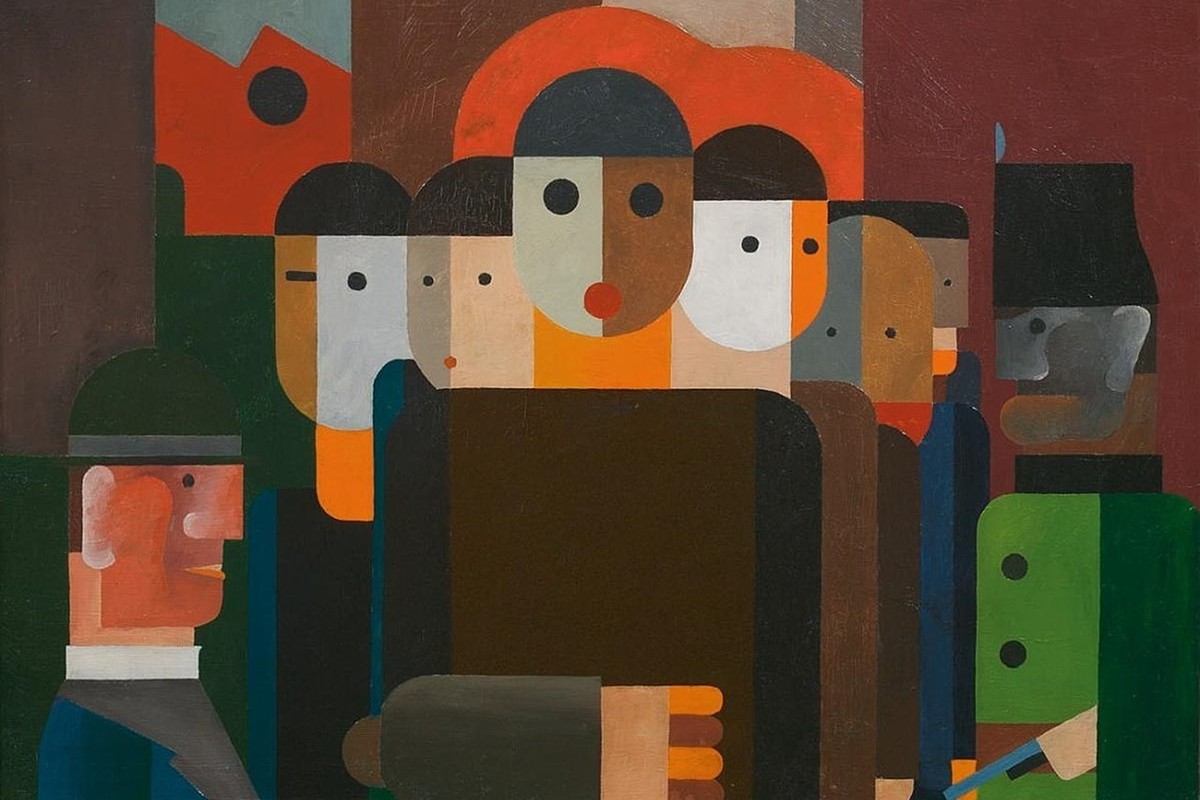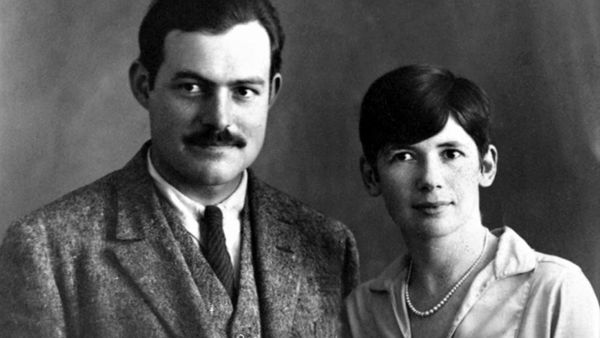I was not a friend of the war because of my strict, orthodox Catholicism. But the inability of una sancta catholica to prevent the mass murder of human beings by one another made me into a Marxist.[1]
This is how the German artist and political activist Franz Wilhelm Seiwert described his political trajectory to a friend in 1929. For him, the First World War marked the moment when communism performed, in Louis Massignon’s phrase, “the cross-examination of Christianity” and Christianity failed as a witness. Yet Seiwert’s journey from a Catholic to secular communist cannot be simplified into yet another variation of the well-worn theme of the secularization of the working-class youth in Wilhelmine and Weimar Germany. For as much as he rejected the Church as a pillar of oppression, of a corrupt order, he could never stop seeking the face of Christ. He believed he found it in revolution.
Franz Wilhelm Seiwert was born in Cologne in 1894, in the devoutly Catholic region of Rhineland. His mother’s home was Oberpleis im Siegenberg—her church St Pancratius, built in the twelfth century. There, the Romanesque relief of the Madonna with Child deeply influenced him and engagements with medieval religious art shaped his own artistic output throughout his life. At the age of seven, Seiwert suffered a severe X-ray burn: an injury he eventually died from at the age of thirty-three, shortly after the Nazis took power. His wound haunted him throughout his life—human suffering became a lingering theme in his work.
Seiwert's Catholicism was not simply cultural, but a deeply held religious faith. His anti-war outlook firstly emerged from his Catholicism. As a child, he joined the Catholic Youth, as an architecture student, he assisted with the restoration of Rhenish Churches. As Christine Hohnschopp described, his Catholicism “was an important starting point for his engagement against the war.” Yet German Catholicism embraced the war enthusiastically as a moral restoration. In the Archbishop of Cologne’s words in 1916: “no sacrifice is too great” to save the blessings of German culture.
Seiwert, who lost his close friend Hubert Nöthen on the Western Front in 1917, turned his back on the Church and threw himself into radical politics. This did not represent an abandonment of religion. In communism, Seiwert desperately sought out the face of Christ, the people who were willing to walk the way of the cross to the bitter end. His first political pamphlet Rufe [Calls], published in 1919, bears this out.
Rufe is underpinned by an eschatological perspective that looks towards the “ultimate,” a state in which “human beings recognize each other.” In an unpublished article, he further outlines that it is a “community in which there will no longer be any oppressed.”[2] On first glance, this may simply reiterate the end-goal of Marxism—the classless society. But such a reading overlooks that his hope for the future of humanity is not a material one—it is a moral one, in which the individual’s spiritual alienation from the community is overcome.
Like the Christian in Theo Pirker’s essay “Towards a Theology of Labour,” Seiwert’s “hopes for the end state of human history are limitless—infinite like God.” In his ideal of the primitive Christian society, Seiwert wrote “The highest was the lowest. The measure was God, was the idea.” Marxism does not replace the Christian ideal of the kingdom of God, but class struggle plows the soil for the seed of a new human community to be sown. In abandoning the Church, Seiwert sought to fulfill the kingdom of God on earth by political means.
What distinguishes Seiwert’s communist ideal from a wholly secularized ideology is his deep feeling that it can only come into being by walking the way of the cross (Kreuzweg), in other words, by taking up a path of suffering. He hailed the fallen of the revolution precisely because they were stoned and crowned with thorns—that is, because they were like Christ.
He stood outside Social-Democratic meetings and factories to call upon the proletariat to fight for the 200,000 communist prisoners of the ruling socialist government. To walk this “way of the cross,” one first had to reject salvation coming from existing political leaders. “Away with the prattle of leaders in parliaments, in demonstrations and on bad paper!” he declared. The class had to overcome the existing order, “prepare for the revolution and make it.”
Evidently, despite his earnest cries to the people, Seiwert saw no saviors in the organizations of the Left. He rejected both the communist KPD and the ultra-left KAPD as well as the old trade unions as the remnants of the bourgeoisie in the proletarian movement. Even anarchism was not saved from his criticism.
In his secular pursuit of the kingdom of God, Seiwert faced a challenge insurmountable in his lifetime. If he believed that the kingdom could be obtained by political means, he could not get around the fact that none of the political means in front of him were up to the task. Every compromise marked a “betrayal of the spirit.”
Even long after Franz Wilhelm Seiwert threw himself into secular radicalism, one senses a continued searching for Christ in his work. Even his name “Franz,” after Francis of Assisi, was bestowed upon him as a nickname by his liberal humanist friends Carl Oskar and Käthe Jatho and he never turned away from it.
Before 1925, he produced a glass painting titled “Christ in the Ruhr,” a figurative constructivist church window of sorts, in which Christ points towards the masses in the Ruhr. In his self-portrait of 1927, Seiwert depicts himself with a cross on his forehead, suggesting he remained deeply rooted within the Catholic tradition in which he was brought up. And of course, his portrayals of the martyrs of the German revolution are replete with allusions to sainthood.
There is a delicious irony in Seiwert’s insistence on canonizing revolutionary martyrs, even if he was not alone in doing so among Weimar artists. The Marxist tradition holds canonization as an insult. In the State and the Revolution, Lenin accuses the ruling classes of canonizing Marx and Engels and hence robbing them of their “revolutionary edge.” One only needs to browse old socialist papers cursorily to find recriminations of “canonizing” figures as diverse as William Morris, Leon Trotsky and Martin Luther King.
However, Seiwert’s Catholicism let him understand that canonization does not place the revolutionary at a safe distance, it makes them perilously close to us. In the Catholic Church, we are all called to be saints. We are all called “to be our bleeding heart” and to be stoned for the cause of love of our brothers. In this sense, sainthood is a terrifying path—but for Seiwert it is the only truly human one, one that demands to be followed.
Why cannot secular politics, even the intransigent liberatory politics espoused by Franz Seiwert, achieve a revolution that founds a new human community? Simply: it fails to account for the historical reality of the cross. For Seiwert, no one suffered as beautifully as Christ did on the cross. However, the suffering of Christ on cross is not simply a past metaphor for human suffering, it incorporates all human suffering in itself—it encounters us in history every day.
The famous phrase “you have the world to win” encapsulates the principal insufficiency of secular radical left politics from a Christian perspective. The Christian revolutionary seeks to redeem the world by taking up the cross, the secular revolutionary wishes to inherit it and escape the cross. Inevitably the desire to inherit the world implicates an acceptance of its drives towards an illusory “progress.” According to the headlines of any orthodox Trotskyist paper, every capitalist advance merely paves the way for the forthcoming socialist victory.
For one who wishes to redeem the world, the world must first be repugnant. As the Catholic socialist Otto Bauer described, the present is “the enduring crisis until the end of time.” The decision for God, the decision to pursue the ultimate reality is one that must be made against the world, not for it. Marxism’s implicit ethical demand is “to be a human being in a community of humanity,” in the words of the theologian Theodor Steinbüchel.
For a Catholic, to be fully human is to overcome fallen humanity—that is to be like Christ. This is the demand of historical time, of our concrete existence, in our constant encounters with the eternity of God. Put simply, conquest of the fallen world does not suffice.
By taking up the cross of revolution, the Christian hopes to transmute this world by grace. The Christian seeks nothing less than the whole of God in the transformation of humanity. The depth of such a transformation is inconceivable in the limited framework of secular left politics.
In an Islamic legend, a group of Najran Christians visit the Prophet Muhammad, determined to prove their faith to him. After a heated discussion, the Prophet challenges them to undergo an ordeal by fire with him and his family, as proof of his own faith. The Christians refuse. Several centuries later, Saint Francis approaches the Sultan and offers to do what the Najran Christians could not bear: entering the fire. This time, it is the Sultan, moved by Francis’s sincerity, who refuses.
The communism of Franz Seiwert, in its earnest demand for a new humanity, did not simply cross-examine Christianity, it dared Christianity to enter the fire—the ordeal of the oppressed in this world. In the inferno of the First World War, Seiwert lost faith in a Church that bears implacable witness to the cross. For him, its embrace of nationalism saw it reduced to ash by injustice. We only wish that he could have seen the dozens, maybe even hundreds, of Saint Francises standing upright and smiling through the flames.
A Selection of Seiwert’s Writings
To the Fallen of the Revolution
Hail the human beings, who fulfilled their lives through deed!
You others, you who knew the glory of being extinguished at the highest point in life, in the ecstasy of the struggle for the idea, you no longer wished to endure your poor dead life!
The world runs empty! Here the human beings rise. They pull up, pull upwards. Are pulled down.
Yet they brightly soar through the eras.
That you existed! That you exist!
You who come to bring the gospel to the poor!
You who are stoned!
You crowned with thorns!
You who are your bleeding heart!
That does not let the suffering of your brothers go!
You who could throw away your life!
You our saints, our martyrs!
We believe in you!
We believe in the spirit that does not die!
We believe in your everlasting resurrection!
We hope for the day of judgement!
We hope for your vindication!
We hope for your presence!
That you deliver us!
Vindication
What we do is not the true deed
What we do is not the ultimate
yet we see the ultimate
that’s why we do what we do
and our deeds even look like betrayal of us, of God, of the spirit
we may do it
we must do it
because we see the ultimate
because all our deeds are the way to it
and the way to us.
An Easter Sermon (“Today or in a hundred years”)
Working people! Today or in a hundred years! Today is the day, when the law of humanity must be fulfilled. Otherwise tomorrow the business that led you into misery will resume and the day after tomorrow, your children will be slaughtered, because business demands it. Do not trust the leaders that call you to “slow advancement,” who let things happen. You must make progress happen. Have the courage to take all responsibility upon yourself until all violence is extinguished in love.
People, do not miss this moment, when the wheel has rolled into your hands. You are now the helper of the human that will end the dead machine, the state, in freedom, in humanity.
Today or in a hundred years!
The old powers are already rising which long oppressed you, the people. They see the traitors, the unresolved, in your own ranks, people, and ally with them to bring about “peace and order.” “Peace and order” which for them means the continuation of their old, corrupt life, securing their dirty profits, life from the blood of the enslaved.
With those who have already long betrayed you, who can only deceive you about their betrayal now, they have already murdered many of your best, your true leaders.
This blood cries to heaven! People, hear this cry! Wake up, tear the threads that they are starting to fetter you with, slowly and gently. Let this blood be sacrificial blood, with which we mark ourselves, that lends us strength, if we must sacrifice ourselves. The more martyrs, the more confessors!
O people, you have too much and too little trust! Too much trust in the led “leaders” and too little trust in yourselves and those who have sacrificed themselves for you. How many more times will you kill the best of your sons before you see what is necessary?
O people, just listen to your sons. Do not listen to the “Crucify!” of Pharisees whose business with you, people, is endangered when the Son of Man approaches you. Be wary, people, it is always the saviors, those who give their bleeding heart to you, people, who the leaders turn you against, people. Listen finally to the saviors. They are your sons, the Sons of Man.
Out of shame and vanity, the false leaders call to you “Crucify!” because they are not ready to give the smallest thing to you. Their envy and vanity cannot bear that someone wants to devote everything to you. Their cunning makes them feel that this unconditional devotion will be the end.
People! We, we poor ones born from you, do not want to create a paradise on earth. We only want a human life. Holy labor in humanity, on Earth. Holy love towards our fellow people, to our brothers.
We want the terror of the good. The terror of the evil has oppressed us, human beings, for long enough. We will have to use its methods until they abolish themselves, until all human beings recognize each other. We will have to use them, knowing that the future of humanity is behind us.
The way of the cross of people to human beings is long. Today it is up to you, people, if it can be shortened a little. If you sink back again, the powers that you overthrew yesterday will drive you down once more and lengthen the way. They cannot stop! With God, a thousand years are like a day and a day is like a thousand years! What is time. Yet you, people, think of your bleeding sons, those bleeding to death, who again must be sacrificed, if you don’t walk this way with courage now. The way that leads to human beings.
[1] Enno Stahl, ‘Kommunion und Kommunismus. Die revolutionäre Eschatologie Franz Wilhelm Seiwerts’ in: Krieg und Utopie. Kunst, Literatur und Politik im Rheinland nach dem Ersten Weltkrieg, eds. Gertrude Cepl-Kaufmann, Gerd Krumeich and Ulla Sommers, (Düsseldorf, Essen, Bunkerkirche, 2006), 141.
[2] Uli Bohnen and Dirk Backes eds., Der Schritt der einmal getan wurde, wird nicht zurückgenommen. Franz W. Seiwert Schriften (Berlin: Karin Kramer, 1978), 67.


